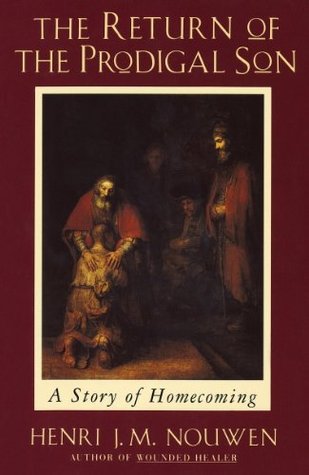More on this book
Community
Kindle Notes & Highlights
Read between
January 26 - February 5, 2022
I am tempted to be so impressed by the obvious sadness of the human condition that I no longer claim the joy manifesting itself in many small but very real ways.
Every moment of each day I have the chance to choose between cynicism and joy. Every thought I have can be cynical or joyful. Every word I speak can be cynical or joyful. Every action can be cynical or joyful. Increasingly I am aware of all these possible choices, and increasingly I discover that every choice for joy in turn reveals more joy and offers more reason to make life a true celebration in the house of the Father.
When I first saw Rembrandt’s Prodigal Son, I could never have dreamt that becoming the repentant son was only a step on the way to becoming the welcoming father.
No father or mother ever became father or mother without having been son or daughter, but every son and daughter has to consciously choose to step beyond their childhood and become father and mother for others.
As I suddenly saw this man appearing in the mirror, I was overcome with the awareness that all the differences I had been aware of during my lifetime seemed so small compared with the similarities.
Jesus shows us what true sonship is. He is the younger son without being rebellious. He is the elder son without being resentful. In everything he is obedient to the Father, but never his slave. He hears everything the Father says, but this does not make him his servant. He does everything the Father sends him to do, but remains completely free. He gives everything, and he receives everything.
am I doomed to remain so caught up in my own need to find a place in my world that I end up ever and again using the authority of power instead of the authority of compassion?
Looking at Rembrandt’s painting of the father, I can see three ways to a truly compassionate fatherhood: grief, forgiveness, and generosity.
I am beginning to see that much of praying is grieving. This grief is so deep not just because the human sin is so great, but also—and more so—because the divine love is so boundless.
To become like the Father whose only authority is compassion, I have to shed countless tears and so prepare my heart to receive anyone, whatever their journey has been, and forgive them from that heart.
I have often said, “I forgive you,” but even as I said these words my heart remained angry or resentful. I still wanted to hear the story that tells me that I was right after all; I still wanted to hear apologies and excuses; I still wanted the satisfaction of receiving some praise in return—if only the praise for being so forgiving!
it demands of me that I step over that wounded part of my heart that feels hurt and wronged and that wants to stay in control and put a few conditions between me and the one whom I am asked to forgive.
This is not the picture of a remarkable father. This is the portrayal of God, whose goodness, love, forgiveness, care, joy, and compassion have no limits at all.
True generosity is acting on the truth—not on the feeling—that those I am asked to forgive are “kinfolk,” and belong to my family. And whenever I act this way, that truth will become more visible to me. Generosity creates the family it believes in.
what greater joy can there be for me than to stretch out my tired arms and let my hands rest in a blessing on the shoulders of my home-coming children?
Life in community does not keep the darkness away. To the contrary. It seems that the light that attracted me to L’Arche also made me conscious of the darkness in myself.
His outstretched hands are not begging, grasping, demanding, warning, judging, or condemning. They are hands that only bless, giving all and expecting nothing.
My people, whether handicapped or not, are not looking for another peer, another playmate, nor even for another brother. They seek a father who can bless and forgive without needing them in the way they need him. I see clearly the truth of my vocation to be a father; at the same time it seems to me almost impossible to follow it.
His loneliness has become endless solitude, his anger boundless gratitude.
As I look at my own aging hands, I know that they have been given to me to stretch out toward all who suffer, to rest upon the shoulders of all who come, and to offer the blessing that emerges from the immensity of God’s love.


